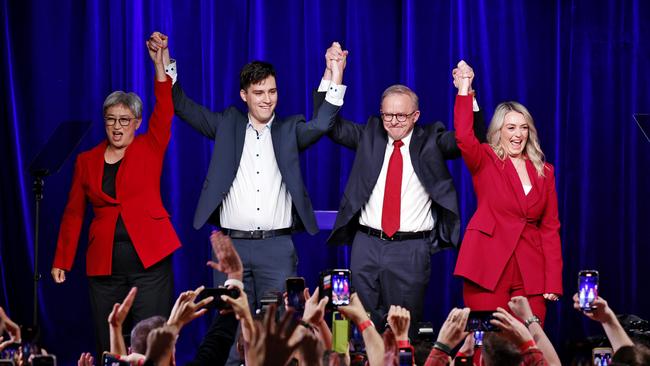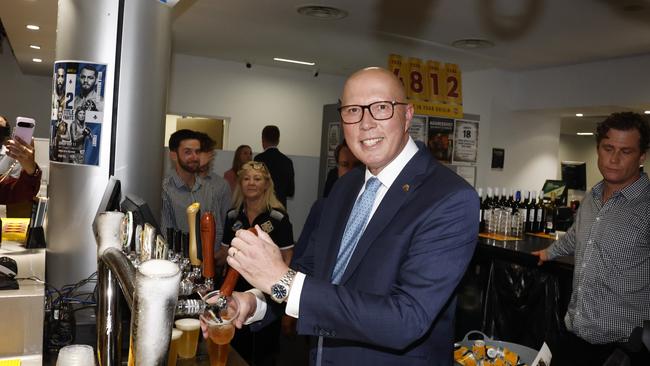
One of more revealing moments on an election night filled with revelations was the sight of Peter Dutton announcing that the highlight of his career was his stint as a defence minister in the Morrison government.
The opposition leader went on to say that on Anzac Day he had “caught up with young veterans in Townsville at the RSL and it reminded me of how lucky we are as a country. I want to acknowledge all those men and women who keep us safe.”
Nothing wrong with any of the above, other than it reminded some Australians of how out of touch Dutton had been with voters’ core interests throughout a fraught campaign. No one expected Dutton to acknowledge the traditional owners, given his commentary about “welcome to country” being overdone given his commentary about “welcome to country” being overdone and counter-productive, but positioning the armed services at the centre of Australian life after an election fought so clearly on domestic, not national, security seemed odd.
Australians may value their military and respect Anzac Day, but for many these are not first-order issues. Indeed, one of the unexamined realities of our shortage of recruits to the armed forces is how the military is seen as white and male and of marginal appeal to aspirational migrant families as a career choice for their kids.
Not long after Dutton conceded, Penny Wong made a very different pitch to middle Australia.

Introducing Anthony Albanese, she talked about a population drawn “from more than 300 ancestries and from the oldest continuing civilisation on that planet”.
If Dutton was leaning into the traditions of Gallipoli, when most Australians were of British descent, Wong was appealing to a country in which one-third of the population was born overseas. If Dutton was leaning into danger, threat and strength, Wong was arguing we had nothing to fear from migration, diversity and our Indigenous history.
In these two short speeches, Australians were asked to see their country – and their futures – through different lenses. Neither provides a complete picture of the nation at a time of great international political and economic upheaval but the election result suggests Australians are available for hope rather than fear.
Dutton’s concession speech was gracious overall but he was up against it on a night when optics mattered. His family stood with him in what has long been the traditional portrait in Australian politics: a man, his wife and three children. In contrast, the carefully orchestrated Labor exercise involved a gay, Chinese-Malaysian-Australian woman, married with children; a divorced father of one; his fiancee and his adult son. Once upon a time, that grouping on an election night stage would have been unthinkable.
On Saturday, as the Labor foursome joined their hands in the air with victory, they reflected modern, complicated but successful families across the nation.
Wong’s role – a reprise of the 2022 election night – can’t be underestimated when the Coalition has so few women in its ranks. It’s unfair to label the Liberal Party as old, white and male, but its lack of women must be addressed if it is going to appeal to more of those 300 ancestries. Women in politics is now a given – except in Coalition ranks, where there could be as few as four women from the Liberals in the House of Representatives.

Labor was too smart to reach out too overtly for the women’s vote during the campaign – there’s plenty of room for pushback on gender these days – yet helping women was at the centre of its approach to working from home.
And out on the hustings it was hard to miss just how much Australia has changed, with so many female candidates in the Labor, Greens and independent ranks in particular. Whether politics is done differently by women is not really the point; instead the gender issue is simply about the reality that our institutions need to reflect our society.
Equally important is whether male politicians truly understand that shift. Once again, it’s often the little things they say and do that make the difference.
Towards the end of the fourth and final television debate between Albanese and Dutton, the Channel 7 anchors questioned the Prime Minister about his controversial decision to buy a house on the NSW central coast at Copacabana. He took it on the chin but then made the point that the clifftop home was purchased equally with his fiancee Jodie Haydon, who, he said, had been “erased” from the story.
Hardly a major part of the yarn, yet it sent a subtle signal to voters that our 60-something Prime Minister has not only navigated a divorce but is finding his way in an equal, modern relationship – which is also being played out amid extreme public scrutiny.
Arguably optics and language matter as much as policies when it comes to securing votes. This campaign suggests the Coalition has some lessons to learn in that area.




